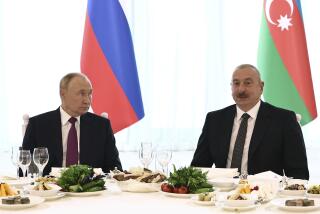Soviet Republic Strives to Break Economic Ranks With Moscow
- Share via
BAKU, Soviet Union — Moving to free a significant part of its economy from Moscow’s control, the Soviet republic of Azerbaijan is studying bids from foreign companies to revive its languishing petroleum industry by investing in new oil fields.
Ajaz Mutalibov, the republic’s president, said late last week that his government has firm offers from Amoco, British Petroleum and Los Angeles-based Occidental Petroleum. Azerbaijan, he said, will soon sign separate 30-year contracts for oil exploration and drilling on the coast near Baku and offshore in the Caspian Sea.
According to Mutalibov, Azerbaijan will sell petroleum and refined products derived from the new drilling on the world market, bypassing the barter system that has obliged the republic to deliver its production to Moscow for token ruble payments since the early days of the Soviet state.
Moscow now pays 120 rubles per metric ton, or less than $5 per metric ton--according to a new auction-based exchange rate--for Azerbaijan’s high-quality light crude, which it exports to more than 40 countries. A metric ton of oil would sell on the world market for more than $150.
Mutalibov made it clear that the oil Azerbaijan supplies other Soviet republics--about 15 million metric tons per year--would continue to be sold through Moscow at ruble prices.
“But the profits from the new oil we extract will be shared between us and the foreign company,” he told a group of Western journalists. “For the first time in 73 years, we are controlling our own resources. We are going to have very high cooperation with the company, because they are going to have a mutual profit, an equal profit.”
Rejecting the confrontational course of political independence declared by the Baltic states and Georgia, Mutalibov and his local Communist government are steering a more moderate path toward greater economic autonomy through direct joint ventures with foreign companies. An oil deal would be the first important breakthrough in that effort.
Last October, this Caucasus republic played host to 700 foreign businessmen at the first Azerbaijan Business Conference and announced that it had drummed up $450 million of potential business. Mutalibov said 20 joint ventures with foreign companies are already operating, including a French clothing factory and an Italian air-conditioning plant. About 190 local companies have been authorized to export products abroad.
So far, Moscow has not interfered heavily with Azerbaijan’s courtship of foreign businessmen. Mutalibov said the republic’s autonomy would be ratified in a new union treaty with Moscow.
But he and other officials admit that ethnic tensions between Azerbaijanis and their neighbors in Armenia--as well as political instability caused by nationalist movements--give potential investors cold feet.
“Some companies are scared to make a contract because they don’t believe in our guarantees,” he said. “What we need is a stable situation. Companies don’t know who to deal with--(Soviet President Mikhail S.) Gorbachev, (Russian Federation leader Boris N.) Yeltsin or Ajaz Mutalibov.”
Baku, the Soviet Union’s fifth-largest city, was once the world’s leading oil center. But its drilling equipment is now as antiquated as its dilapidated turn-of-the-century buildings. Production has fallen below 250,000 barrels a day, with the lack of deep-drilling technology limiting the republic’s ability to tap its considerable remaining reserves. The region is now outproduced by Soviet wells in Siberia.
Even so, oil is still the leading employer here. Azerbaijan’s 7 million people produce an annual export surplus of 1.8 billion rubles--or some $66 million--in oil, cotton, tea and other products, according to the local government. Some independent economists estimate the republic’s real export potential to be about $500 million annually.
SOVIET ‘COERCION’
Soviet prime minister calls for coercion to right economy. A1
More to Read
Sign up for Essential California
The most important California stories and recommendations in your inbox every morning.
You may occasionally receive promotional content from the Los Angeles Times.













